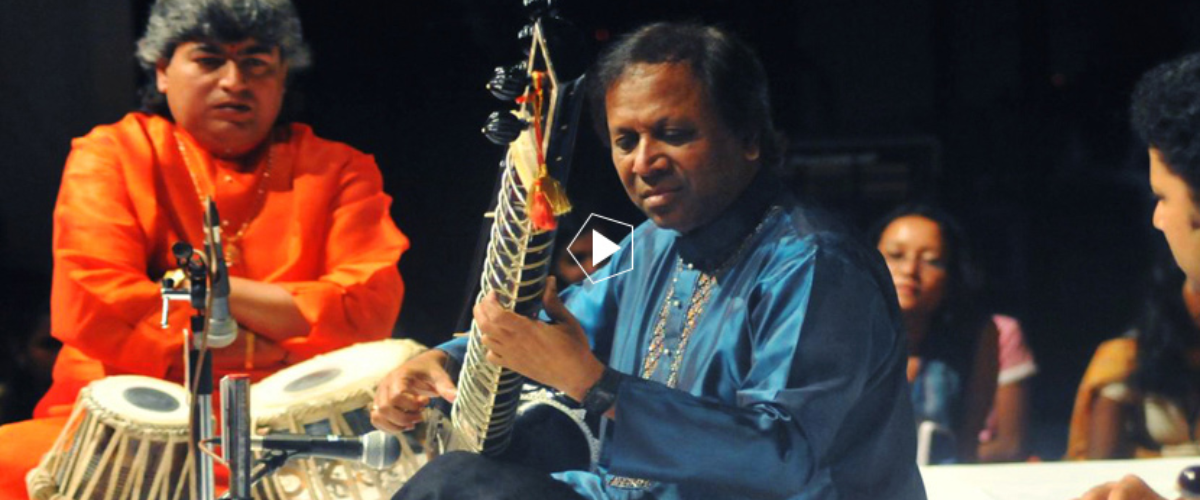Abhēri is an upāṅga janya1 of the 22nd mēḷakarta2 Kharaharapriya. It is an auḍava-sampūrṇa3 rāga. The svaras4 present in this rāga are ṣaḍja, sādhāraṇa gāndhāra, śuddha madhyama, pañchama, kaiśiki niṣāda.

Lorem ipsum dolor sit amet, consectetur adipisicing elit, sed do eiusmod tempor incididunt ut labore et dolore magna aliqua. Ut enim ad minim veniam, quis nostrud exercitation ullamco laboris
S G2 M1 P N2 Ṡ - Ṡ N2 D2 P M1 G2 R2 S.
In Western music notation, if C is taken as the base or tonic note, then the scale is
C D# F G A# C – C A# A G F D# D C
Abhēri is a rakti rāga or a rāga which pleases instantaneously.
Gāndhāra and madhyama are rāgachāyā svaras8. Madhyama and niṣāda are nyāsa svaras9. G-N are vādi-samvādi svaras (consonant notes).
It can portray rasas10 like karuṇa (compassion) very effectively, just as it can convey the feeling of devotion or bhakti bhāva.
Some of the signature phrases of this rāga are
G M P N Ṡ N D P, - M P N D P M G, - S G M P G, R S, - Ṇ S M, - M P G, - G M P N, D, P, - M P N, Ṡ, - P N Ṡ Ġ Ṙ N, Ṡ, - N Ṡ Ṁ, Ġ, - Ṡ Ġ Ṁ Ṗ Ġ, Ṙ N, Ṡ, - N, D M, P, - G M P Ṡ,, N D P G, - G M N D P G, R Ṇ, - S M G R S,
A few compositions in this rāga are-
| Nagumōmu | Tyāgarāja |
| Vīṇābhēri | Muttuswāmi Dīkṣitar |
| Bhajarē mānasa | Mysore Vāsudēvāchārya |
| Palukutēnelatalli | Tāḷḷapākam Annamāchārya (tuned by Vidwan Nedunuri Krishnamurthy) |
1 A derived rāga which has other notes in addition to the notes of its own parent rāga.
2 Parent rāga
3 Auḍava- A scale with 5 notes ( Pentatonic). Sampūrṇa- A scale that has all 7 notes. Auḍava-sampurna is a scale with 5 notes in ascending order and 7 notes in descending order.
4 Notes
5 There are 16 varieties of svaras in Carnatic music. They are:
| Sa (ṣaḍja) | ṣaḍja | C | ||||||
| Ri (riṣabha) |
|
|
||||||
| Ga (gāndhāra) |
|
|
||||||
| Ma (madhyama) |
|
|
||||||
| Pa (pañchama) | pañchama | G | ||||||
| Da (dhaivata) |
|
|
||||||
| Ni (niṣāda) |
|
|
Note: The above table gives you information on the notes as they are referred to between Sa on the middle octave to the Sa on the upper octave. It needs to be interpreted based on the Raga and its scale formation as given above. In the table given above, there are notes that use the same frequencies but, they are spelt differently. For example, Ri 2 is equal to Ga 1, Da 2 is equal to Ni 1. It needs to be seen in the context of the Raga that is being portrayed. Also, because of the ornamentation (Gamakas) most often the notes are not portrayed as it is played out on the Piano. There is a certain distortion in the frequencies making it difficult to identify the actual notes involved in the scale formation.
6 Scale in ascending order
7 Scale in descending order
8 System of rāga classification in ancient Tamizh music.
9 Notes which most effectively bring out the mood of the rāga
10 The landing notes for elaboration in various stages during improvisation.
11 Emotions or moods.
Hariharan, M. and Kuppuswamy, Gowri. 2011. Comparative Music- Fundamentals of Western Music. Nagercoil: CBH Publications
Keshavamurthy, R.R. 1964. Rāgalakṣaṇa mattu Rāgakōśa. Bengaluru: Gāna Viśārada Biḍāram Kṛṣṇappa Smāraka Saṅgīta Vidyālaya
Rajarao, Mysore L. 2003. Saṅgīta Śāstra Chandrike. Bengaluru: Karnataka Sangeetha Nritya Academy
Rao, B. Subba. 1980. Raganidhi. Madras: The Music Academy
Sambamoorthy, P. 2018 (reprint of eighth edition published in 1998). South Indian Music (Volumes 1 to 6). Chennai: The Indian Music Publishing House
Vasantalakshmi, R. 2007. Karnāṭaka Saṅgītaśāstra vāhini. Mysore: Bharathi Prakashana
![]()
Enjoy nearly 1000 handpicked Raga performances,
exclusive behind-the-scenes interviews, and insightful documentaries & TV shows,
all at your fingertips.
Keep up to date with the latest news, events, music and musings across our social channels
For hundreds more clips and shorts, vist our YT page here 